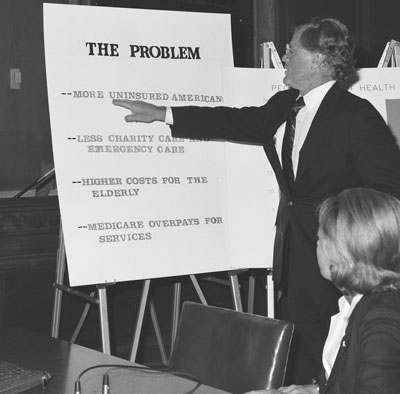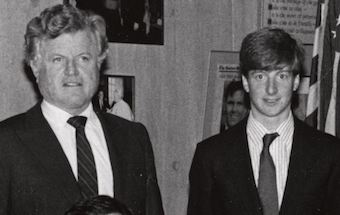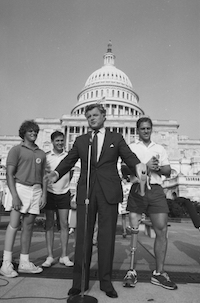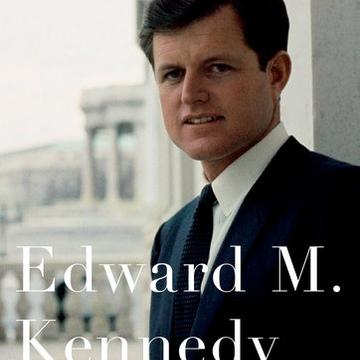Fighting for universal healthcare
After a lifetime of health scares, Kennedy posthumously fulfilled his goal of affordable coverage with Obamacare
[Excerpted from chapter 14 of Edward M. Kennedy: An Oral History, by Barbara Perry]

The origins of Senator Kennedy’s interest in healthcare are traceable to experiences throughout his life, with severe medical conditions befalling him and his family. As a young lawyer, Teddy worked in the Massachusetts Cancer Crusade, raising funds to battle a disease that would eventually take a heavy toll on his loved ones and, ultimately, take his life. Senator Kennedy had learned at an early age the importance of receiving healthcare, a point that was undoubtedly reinforced after he broke his back and sustained other serious injuries in a 1964 plane crash during his first Senate term.
Through six months of convalescence and recuperation, Kennedy recognized that he enjoyed certain advantages unavailable to less fortunate Americans. He witnessed firsthand the unfairness of the health insurance system while his son Teddy Jr. endured arduous treatment for bone cancer in the early 1970s. Senator Kennedy learned that the parents of other children in similar situations could not afford the same level of successful treatment that his son received under the health insurance policy provided to members of Congress and their families. Moreover, Kennedy could take time away from his job to care for his son, a luxury many parents did not enjoy.
Kennedy’s battle to reform what he saw as a broken and unfair system led him back repeatedly to one of the defining issues of his career—universal healthcare insurance. In the early 1970s, he held private negotiations on the issue with the Nixon White House. Kennedy ultimately broke with President Jimmy Carter over how to approach healthcare policy, and affordable medical care for all Americans became the central theme of Teddy’s unsuccessful 1980 presidential nomination campaign. In the early 1990s, Senator Kennedy worked closely with President Bill Clinton and First Lady Hillary Clinton on trying to pass national health insurance legislation, but the administration’s bypassing of Congress in developing the policy ultimately doomed it. Teddy’s collaboration with President Barack Obama on the Patient Protection and Affordable Care Act (PPACA), which passed in 2010, seven months after the senator’s death, appropriately made it the crowning achievement of his Senate career.

At the White House bill-signing ceremony, attended by Senator Kennedy’s widow, Vicki Kennedy, his son, Congressman Patrick Kennedy, and his niece, Caroline Kennedy, President Obama observed, “I remember seeing Ted walk through that door in a summit in this room a year ago, one of his last public appearances, and it was hard for him to make it, but he was confident that we would do the right thing.”
To Edward Kennedy, access to affordable healthcare was a right, not a privilege. No issue was more important to him than working to ensure that all Americans had access to quality medical treatment. His son Patrick placed a poignant note on his father’s Arlington grave immediately after passage of the PPACA. It read: “Dad, the unfinished business is done.”
Q: This is the March 28th [2008] session in Washington with Senator Kennedy. The subject today is healthcare, and Vicki Kennedy is with us once again, thankfully….

Edward M. Kennedy: I thought maybe I’d start off initially with my association with the health issue and also the family’s association with the health issue and why it was a central force in my life growing up, and with my early days in the United States Senate—how the opportunity to become involved in it from a policy point of view, in many respects, goes back to my own observations about the importance of health in a personal way, but also in a way that exposed me as a young person to the policy considerations, and the impact that it had on me.
I have commented, probably earlier in our discussions, about the fact that my sister Rosemary was mentally and intellectually challenged, and how she always was considered special in our family. As a small child, I found that I could play with children that were my age, or in many instances I would find that she was both available, acceptable, and desiring to play ball with me. We’d take a soccer ball and either play soccer, or bounce a lighter ball, like a beach ball, and play tag with it, or other children’s games. She always seemed to be willing to spend more time with me than the others, who were always distracted in playing other games.
I noticed that she had some special kinds of needs. I observed that early as a child. I didn’t understand it in the early years, and it took a while, obviously, to grasp the full dimensions of that, but I noticed that that was different. The regular kinds of childhood activities with childhood accidents when I was growing up were probably not different from other kinds of activities of large families.
I suppose the first major challenge that I saw was in 1961 when my father had the very serious stroke, which really disabled him in a very important way. He lived on for a number of years afterwards, but I saw the enormous—I was exposed to the dramatic moments of the time right after he had that stroke, about whether he was going to live or die, and also to the whole issue of being significantly disabled, and the corresponding actions of incredible care and loving attention that he was able to receive. The dedication of nurses and healthcare personnel, and the patience and the love and commitment of so many of those who worked with him, took an immense amount of time. Attention to this was a very powerful factor in terms of my whole observation of this part of my life….
I was elected to the Senate, and in the early years as my family arrived I was exposed to the power of asthma with a small child, Patrick [Kennedy]. We detected when he was 2 that he was a chronic asthmatic. He had the test that is given to children, where they have pinpricks along their arm—I think it’s 24 pinpricks—of different kinds of allergies. His arm looked like a nuclear meltdown; it just absolutely reddened, all of it. He was allergic to everything.
My brother Jack Kennedy was allergic to cat fur, and my sister Pat had allergies, and maybe the others had some, but I certainly noticed those as they were growing up. My brother Jack would come back to the Cape and would go into his room, and he’d come out about an hour later, storming mad, wondering who let the cat sleep in the bed while he had been away, or some cat had come on in. He’d be battling the allergies for the next several hours.
When Patrick developed it, we brought in medical experts at least once a year and sometimes twice a year, from around the country. They came in at nighttime. They would examine Patrick and talk with him, and then they would go off by themselves and have a meeting at a hotel, and then they would come over in the morning and brief me on their understanding of his condition, and their recommendations. Since he was chronic, there was a whole series of different types of medications that they would talk about, and the advantages and disadvantages of each. That continued all the way up through his graduation from Andover, even in his last year at Andover. The last meeting was at the Parker House in Boston. He had some time off, and my son Teddy was going to take some time off, so the three of us were going to go away, and the doctor said, “Don’t go farther than 35 or 40 minutes from a hospital.” So we went down to Key Biscayne, because we were 35 minutes away from the hospitals down in Miami. So, it was a major factor and a force as he was growing.
Later, in the early ’70s, we were faced with the health challenges that Teddy was facing with cancer of the leg. I always thought it was osteosarcoma, but I’ve been told it may have been chondrosarcoma. I remember very clearly his talking about and complaining about a bump on his leg, and how it wasn’t getting any better, and it was getting sorer. One morning I was headed to Boston and I was getting briefed about the various health meetings I was having in Boston. One of the staff people, Phil Caper, was also a doctor, and I had mentioned to Phil about the swelling. He examined Teddy and said, “You’ve got to get an X-ray on it right away.” I remember hearing later in the morning when I was up in Boston, about how they looked at the X-ray and saw the cancer, and that this was just enormously serious—life-threatening. It was going to take immediate and dramatic action, which presented a wide range of both emotional and real decisions about the removal of his leg—the conversation prior to that time and the conversation after that time.
At the same time, my niece was getting married, Kathleen. So this was a very emotional, roller-coaster period in my life. And then much later, my daughter Kara found out that she had lung cancer. That was as a result of a picture that had been taken of her lung after— She had pain in her shoulder and was under medical attention for stenosis, and the very good doctor…suggested that they take a picture of the shoulder. They found that she had lung cancer, and we had to move within a matter of hours. We went, later that afternoon, up to Johns Hopkins and had discussions up there with their medical team, which were very unsatisfactory. Then we had medical consultations with some experts and made a decision to follow a different route, which was surgery, which has worked out very successfully. She’s now four or five years free from any cancer.
So healthcare was something that had a real powerful impact. Also, in 1962, I remember the incident when my brother [Jack] lost a baby to hyaline membrane disease. The child lived three days and then died at the Children’s Hospital in Boston. The interesting factor and force of all of this is that, if the child had been born two years later, it would have survived. The progress that was made in medical research would have permitted the child to survive. Here was the person who was the president of the United States, with all of the assets that he could have, and still was unable to see a positive outcome of this. Within all of that, financial security was certainly present.
It was present also in 1964 when I had the plane crash we’ve described earlier. I was able to get medical attention…. I was exposed to the most extraordinary groups of doctors and nurses…. The commitment and the dedication of the doctors and the nurses, and the support systems and the professionals, were just breathtaking. I think it probably led me to the very strong commitment that I’ve always had, politically, to strong support for nurses, for support personnel, because I always recognized their indispensable role. The doctors, yes, but the support personnel for their patience and their time.…
